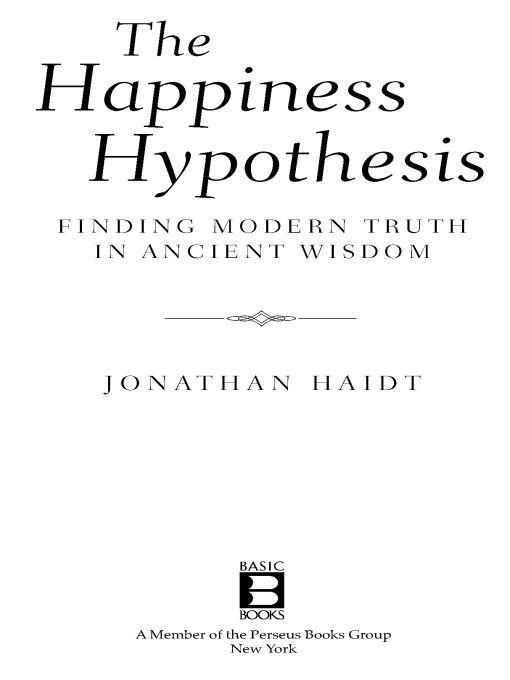
The Happiness Hypothesis
Finding Modern Truth in Ancient Wisdom
کتاب های مرتبط
- اطلاعات
- نقد و بررسی
- دیدگاه کاربران
نقد و بررسی

Starred review from November 7, 2005
The spirit is willing but the flesh is weak, lamented St. Paul, and this engrossing scientific interpretation of traditional lore backs him up with hard data. Citing Plato, Buddha and modern brain science, psychologist Haidt notes the mind is like an "elephant" of automatic desires and impulses atop which conscious intention is an ineffectual "rider." Haidt sifts Eastern and Western religious and philosophical traditions for other nuggets of wisdom to substantiate—and sometimes critique—with the findings of neurology and cognitive psychology. The Buddhist-Stoic injunction to cast off worldly attachments in pursuit of happiness, for example, is backed up by Mihaly Csikszentmihalyi's studies into pleasure. And Nietzsche's contention that what doesn't kill us makes us stronger is considered against research into post-traumatic growth. An exponent of the "positive psychology" movement, Haidt also offers practical advice on finding happiness and meaning. Riches don't matter much, he observes, but close relationships, quiet surroundings and short commutes help a lot, while meditation, cognitive psychotherapy and Prozac are equally valid remedies for constitutional unhappiness. Haidt sometimes seems reductionist, but his is an erudite, fluently written, stimulating reassessment of age-old issues.

Starred review from January 15, 2006
Psychologist Haidt (Univ. of Virginia) studies morality across cultures and historical periods, bringing prophets and philosophers together with contemporary science to forge a fresh, serious, elevating guide to living everyday life better. Integrating research from Harry Harlow's monkeys and John Bowlby's toddlers and the positive psychology of A.H. Maslow, Martin Seligman, and Mihaly Csikszentmihalyi with his own, Haidt proves to be a teacher who brings psychology to a new level of relevance for general readers. Finding common ground among cultures and diversity within them, he advocates for balance, empathy, and respect -and against naï ve realism as in the myth of pure evil. -Gossip is a policeman and a teacher. Without it there would be chaos and ignorance - sums up several typical pages of discussion girded with apt studies. Happiness comes from relationships, he concludes, but this oversimplifies his method, which presents deep learning enriched with creative thinking, feeling, life experience, and a touch of self-disclosure that makes the reader want to know him. Along with Gregory Berns's Satisfaction and Philip Cushman's Constructing the Self, Constructing America, this makes a trio of great books on self, society, and the sacred for public and academic libraries." - E. James Lieberman, George Washington Univ. Sch. of Medicine, Washington, DC"
Copyright 2006 Library Journal, LLC Used with permission.

January 1, 2006
Using the wisdom culled from the world's greatest civilizations as a foundation, social psychologist Haidt comes to terms with 10 Great Ideas, viewing them through a contemporary filter to learn which of their lessons may still apply to modern lives. He first discusses how the mind works and then examines the Golden Rule ("Reciprocity is the most important tool for getting along with people"). Next, he addresses the issue of happiness itself--where does it come from?--before exploring the conditions that allow growth and development. He also dares to answer the question that haunts most everyone--What is the meaning of life?--by again drawing on ancient ideas and incorporating recent research findings. He concludes with the question of meaning: Why do some find it? Balancing ancient wisdom and modern science, Haidt consults great minds of the past, from Buddha to Lao Tzu and from Plato to Freud, as well as some not-so-greats: even Dr. Phil is mentioned. Fascinating stuff, accessibly expressed.(Reprinted with permission of Booklist, copyright 2006, American Library Association.)

























دیدگاه کاربران